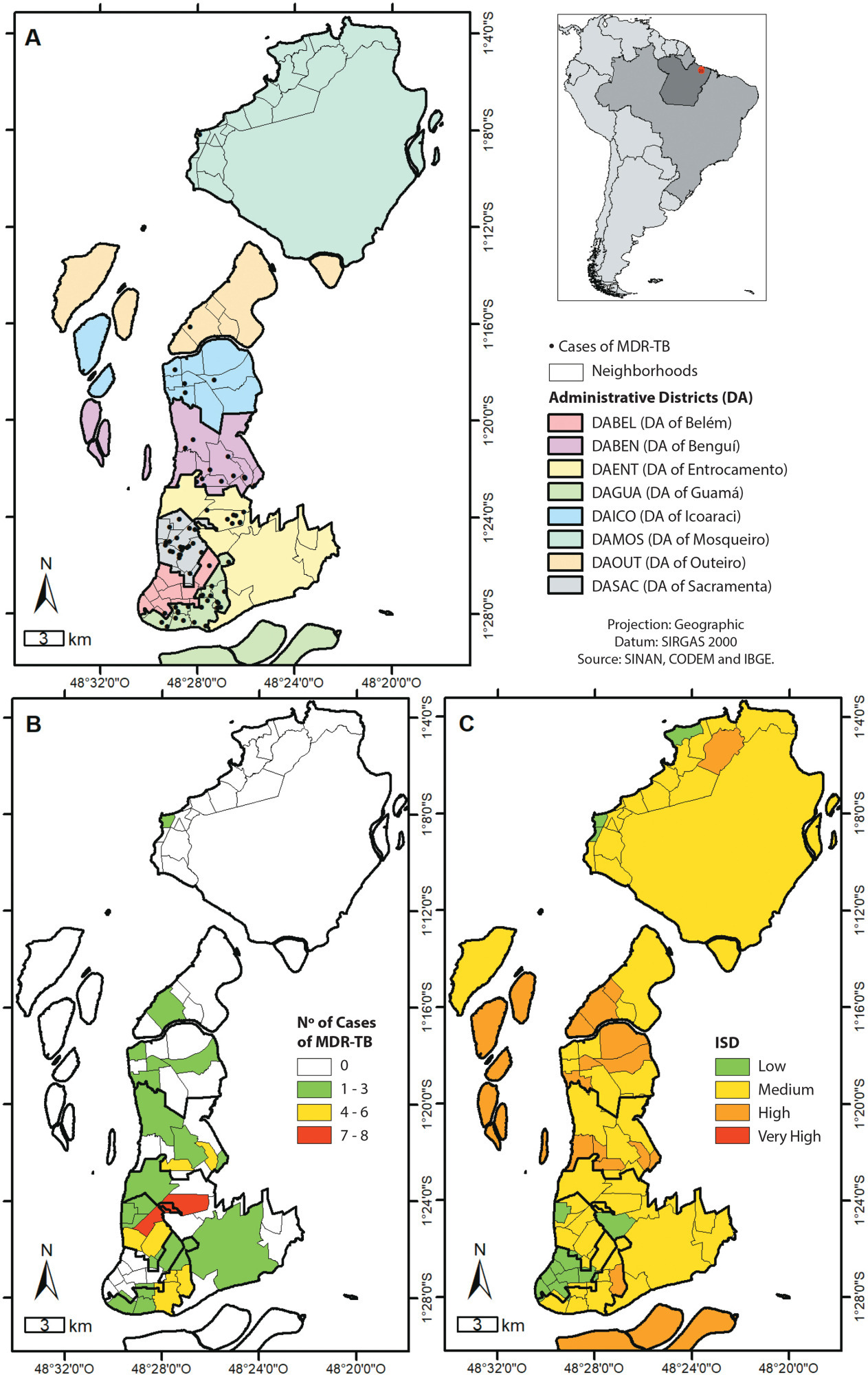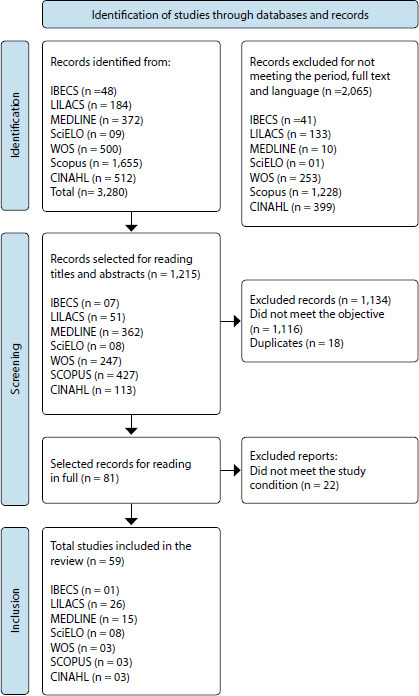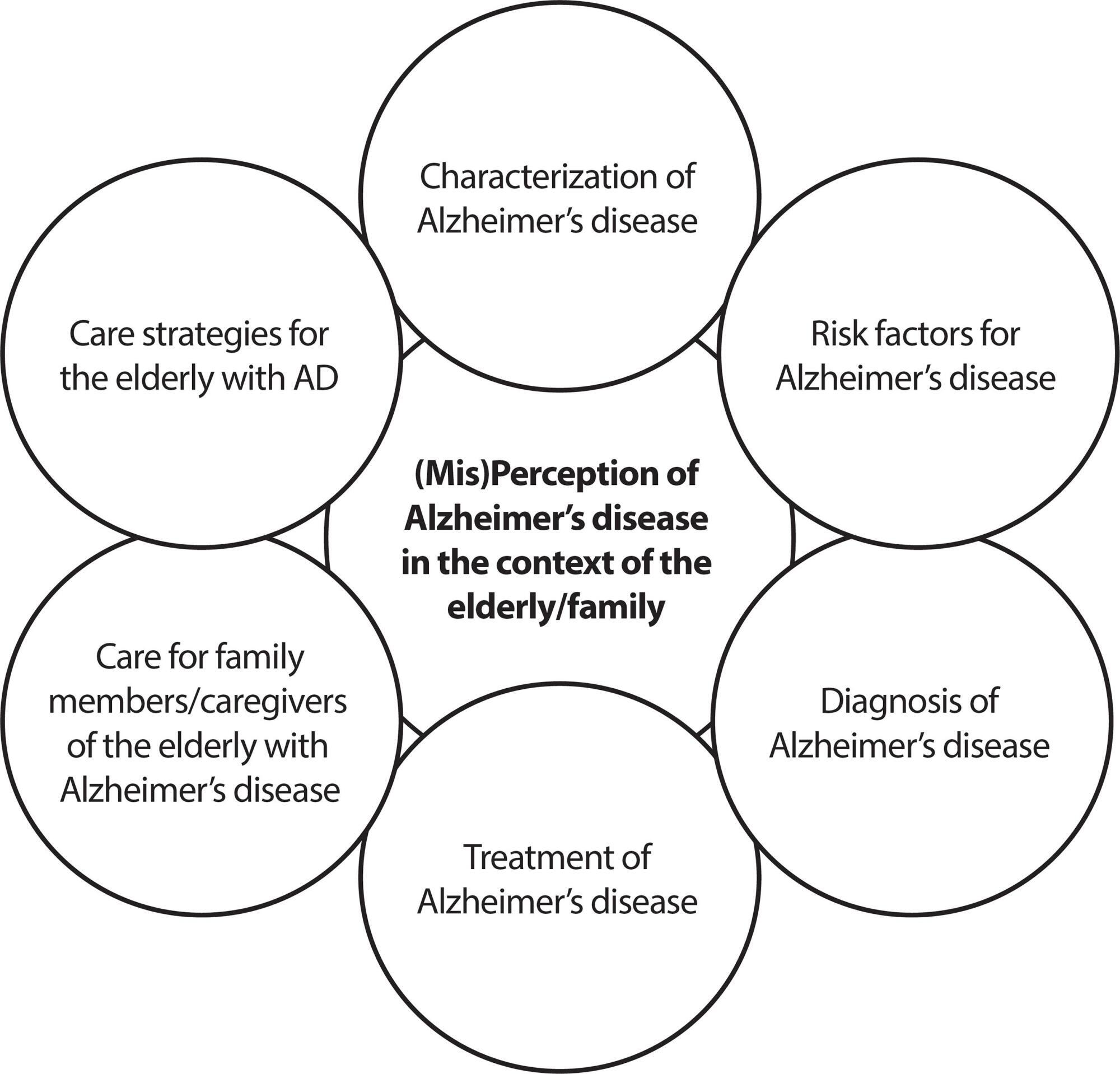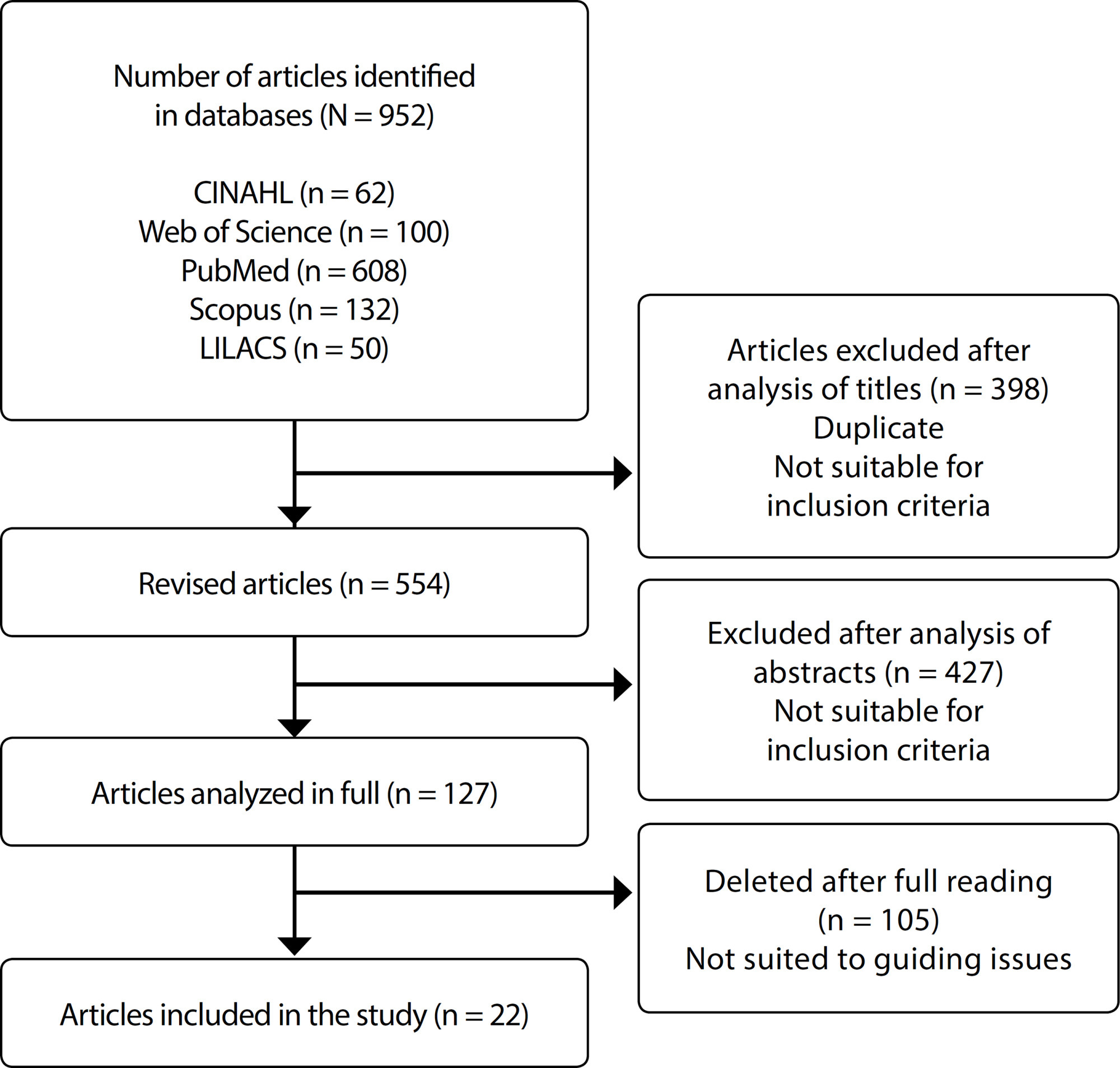-
06-01-2015
Elderly families of South of Brazil in the Health Strategy
Revista Brasileira de Enfermagem. 2015;68(3):406-413
Abstract
Elderly families of South of Brazil in the Health Strategy
Revista Brasileira de Enfermagem. 2015;68(3):406-413
DOI 10.1590/0034-7167.2015680305i
Views0See moreABSTRACT
Objective:
to characterize families and health status of the elderly in the Family Health Strategy and to verify the association of family composition with sociodemographic characteristics and health of the elderly.
Method:
population-based study with 215 families and 266 elderly, linked to the Family Health Strategy from a city of Rio Grande do Sul state.
Results:
there was predominance of nuclear family composition, considered as the main source of informal support, families of female elderly (62.6%) and cardiovascular complication. The nuclear structure was signifi cantly associated with female gender (PR = 0.77; p = 0.025) and smoking (PR = 1.35; p = 0.009).
Conclusion:
the results reinforce the need to maintain a network of formal and informal support to the elderly and their families to preserve the independence or to postpone the decline in functional capacity.
-
06-01-2015
From real to ideal – the health (un)care of long-lived elders
Revista Brasileira de Enfermagem. 2015;68(3):398-405
Abstract
From real to ideal – the health (un)care of long-lived elders
Revista Brasileira de Enfermagem. 2015;68(3):398-405
DOI 10.1590/0034-7167.2015680304i
Views0See moreABSTRACT
Objective:
to analyze similarities and dissimilarities in the meanings assigned to health care by long-lived elders and nursing professionals in a healthcare setting.
Method:
ethnographic qualitative research, based on the Spradley-McCurdy method and the interpretive anthropology of Geertz and Kleinman. The sample consisted of 20 key informants. Data were collected through participatory observation and ethnographic interviews from March to October 2013 and analyzed in domains, taxonomies and cultural themes.
Results:
Six domains and cultural taxonomies emerged and revealed reasons, attributes, and resources in providing care in relationship to long-lived elders and nursing professionals; fi nally, the following cultural theme emerged: the real to the ideal – the health (un)care of long-lived elders.
Conclusion:
The study showed the distance between the desired and actual health care provided to aged people in the scenario studied.
-
06-01-2015
Rescuing the pleasure of playing of child with cancer in a hospital setting
Revista Brasileira de Enfermagem. 2015;68(3):391-397
Abstract
Rescuing the pleasure of playing of child with cancer in a hospital setting
Revista Brasileira de Enfermagem. 2015;68(3):391-397
DOI 10.1590/0034-7167.2015680303i
Views0See moreABSTRACT
Objective:
to dimension spaces and people that act on playing of children with cancer in outpatient treatment.
Method:
qualitative research developed with the creative sensitive method. A total of twenty two family members of seven children with cancer in outpatient treatment at a public hospital in Rio de Janeiro participated of this research. Data were generated in the family members’ homes, from September 2011 to May 2012.
Results:
after the diagnosis of childhood cancer, there was a change of scene and in the people who interact and play with children. Hospital has a central place for it, since children discover the pleasure of playing in this setting.
Conclusion:
the health care professional, especially nurses, who work on hospital care needs, should develop the ability of facilitate playing and therefore, enable care that promotes childhood development.
-
06-01-2015
Child Health Surveillance: nurses perspective
Revista Brasileira de Enfermagem. 2015;68(3):384-390
Abstract
Child Health Surveillance: nurses perspective
Revista Brasileira de Enfermagem. 2015;68(3):384-390
DOI 10.1590/0034-7167.2015680302i
Views0See moreABSTRACT
Objective:
to analyze conceptions of nurses on child health surveillance in family health units.
Method:
a qualitative study with thematic analysis of the data, based on the paradigm of Health Surveillance. Interviews were conducted with 13 nurses in a countryside city in the state of Sao Paulo.
Results:
nurses conceived child health surveillance as an active monitoring, which should be comprehensive, identifying risks/vulnerabilities, through multidisciplinary and intersectoral actions that are dependent on maternal involvement. We found partial development of these assumptions in practice, due to diffi culties such as lack of maternal involvement in the proposed actions, lack of time for discussion and adoption of measures in the units and disarticulation between levels and sectors of the city.
Conclusion:
a greater political and technical investment is needed to ensure the adoption of this model in different sectors and levels of care of the city.
-
06-01-2015
As diversas faces da Integridade em Pesquisa: por uma Enfermagem íntegra!
Revista Brasileira de Enfermagem. 2015;68(3):375-377
Abstract
As diversas faces da Integridade em Pesquisa: por uma Enfermagem íntegra!
Revista Brasileira de Enfermagem. 2015;68(3):375-377
DOI 10.1590/0034-7167.2015680301i
Views0Recentemente, tivemos oportunidade de participar da 4ª Conferência Mundial de Integridade em Pesquisa, no Rio de Janeiro. Para nós, pesquisadores, docentes, autores, pareceristas e editores científicos de periódicos de Enfermagem foi um evento divisor de águas: de ora em diante precisamos apertar o passo para alcançar as áreas que já têm as questões de Integridade […]See more -
06-01-2015
The many sides of Research Integrity: For Integrity in Nursing!
Revista Brasileira de Enfermagem. 2015;68(3):375-377
Abstract
The many sides of Research Integrity: For Integrity in Nursing!
Revista Brasileira de Enfermagem. 2015;68(3):375-377
DOI 10.1590/0034-7167.2015680301i
Views1We recently had the opportunity to participate in the 4th World Conference on Research Integrity in Rio de Janeiro. For us researchers, professors, authors, reviewers and scientific editors of nursing periodicals, the event was a watershed: From this point forward, we must step up our game and catch up with other areas that already discuss […]See more -
01-01-2015
Professional Master’s Degree: potential contribution to Advanced Practice Nursing
Revista Brasileira de Enfermagem. 2015;68(6):1186-1189
Abstract
Professional Master’s Degree: potential contribution to Advanced Practice Nursing
Revista Brasileira de Enfermagem. 2015;68(6):1186-1189
DOI 10.1590/0034-7167.2015680626i
Views0See moreABSTRACT
A reflection articleabout the contribution of Master’s Degree Programs in Advanced Practice Nursing and the Universal Health Coverage and the Universal Health Access, topicsthat have been discussed by the Pan American Health Organization, and which the Brazilian Nursingrequires not just appropriate, but further studyto reflect in order to define directions for our profession.
-
01-01-2015
Concept of family insufficiency in the aged: critical literature analysis
Revista Brasileira de Enfermagem. 2015;68(6):1176-1185
Abstract
Concept of family insufficiency in the aged: critical literature analysis
Revista Brasileira de Enfermagem. 2015;68(6):1176-1185
DOI 10.1590/0034-7167.2015680625i
Views0See moreABSTRACT
Objective:
to identify the attributes of the “family insufficiency” concept of the aged in the literature.
Method:
critical literature analysis.
Results:
family insufficiency is characterized as a complex process of psychosocial interaction, founded mainly on low social support of the aged and impaired family ties. Its antecedents are found in contemporary transformations within the family system, intergenerational conflicts, impaired family relationships and social vulnerability of the family. The consequences of family insufficiency include social vulnerability of the aged, decline of psychological and functional health, lower quality of life and unsuccessful aging. An original theoretical proposal was elaborated for the concept of family insufficiency in the elderly, with the identification of its attributes, antecedents and consequences.
Conclusion:
the findings of this study constitute a theoretical advancement in the Family Insufficiency Syndrome in elderly people and provide data for future field research in developing the concept.
-
ORIGINAL ARTICLE10-19-2020
Spatial patterns of multidrug-resistant tuberculosis: correlation with sociodemographic variables and type of notification
Revista Brasileira de Enfermagem. 2020;73:e20190845
Abstract
ORIGINAL ARTICLESpatial patterns of multidrug-resistant tuberculosis: correlation with sociodemographic variables and type of notification
Revista Brasileira de Enfermagem. 2020;73:e20190845
DOI 10.1590/0034-7167-2019-0845
Views1See moreABSTRACT
Objective:
Correlate the cases of multidrug-resistant tuberculosis and its spatial patterns with the type of notification and sociodemographic variables.
Method:
Ecological study carried out in the municipality of Belém, with 77 cases of multidrug-resistant tuberculosis registered in the Special Treatment Information System for Tuberculosis, between 2012 and 2016. For analysis, the data was debugged followed by geo-referencing in ArcGis 10.3 and Terra View 4.2.2. To relate the cases with the type of notification, the BioEstat 5.4 software was used, with a significance level of 95%.
Results:
Of the total, 40 (52%) were new cases; 27 (35%), relapses; and ten (13%) were re-enrolled after leaving. Multidrug-resistant tuberculosis was randomly distributed and related to income, household, territorial cluster and water supply. There was a concentration of cases in two administrative districts, corresponding to 28.5% and 27.3% of the total, with a median Sociodemographic Index.
Conclusion:
Behavior of multidrug-resistant tuberculosis influenced by sociodemographic indicators.

-
ORIGINAL ARTICLE09-23-2022
Analysis of the concept of cardiovascular risk: contributions to nursing practice
Revista Brasileira de Enfermagem. 2022;75(4):e20210803
Abstract
ORIGINAL ARTICLEAnalysis of the concept of cardiovascular risk: contributions to nursing practice
Revista Brasileira de Enfermagem. 2022;75(4):e20210803
DOI 10.1590/0034-7167-2021-0803
Views0See moreABSTRACT
Objectives:
to analyze the concept of cardiovascular risk to support nursing practice.
Methods:
this is an analysis to define the concept of cardiovascular risk, through the use of eight steps of Walker’s and Avant’s framework, using a literature review in indexed scientific journals.
Results:
cardiovascular risk is defined in a broad and original way as a context of health and nursing care that makes it possible to identify modifiable (cardiometabolic, behavioral, psychosocial, cultural and occupational) and non-modifiable (biological) risk factors for cardiovascular diseases that act as early and interrelated markers, of multiple and heterogeneous etiology, predisposing to cardiovascular vulnerability.
Conclusions:
with the analysis and definition of the concept of cardiovascular risk, we realized that it will be possible to base nursing practice, with implications in clinical practice for identifying and reducing risk factors for cardiovascular diseases, with nursing relevance in the care of these subjects.

-
ORIGINAL ARTICLE07-13-2020
Awareness raising workshop for nursing students on the elderly with Alzheimer’s disease: contributions to education
Revista Brasileira de Enfermagem. 2020;73:e20190021
Abstract
ORIGINAL ARTICLEAwareness raising workshop for nursing students on the elderly with Alzheimer’s disease: contributions to education
Revista Brasileira de Enfermagem. 2020;73:e20190021
DOI 10.1590/0034-7167-2019-0021
Views1See moreABSTRACT
Objective:
To describe the contribution of an awareness-raising workshop for nursing students on Alzheimer’s disease in the context of the elderly/family.
Methods:
Strategic action-research developed with 15 university students from the sixth to the eighth semester of Nursing at a university institution in the Rio Grande do Sul. The data collected through semi-structured interviews, before and after an awareness-raising workshop on Alzheimer’s disease in elderly/family, were subjected to thematic content analysis.
Results:
Six categories were identified that concern (Mis) perception of Alzheimer’s disease in the context of elderly/ family, from the characterization; risk factors; diagnosis; treatment of Alzheimer’s disease; from care to family members/caregivers; and care strategies for the elderly with Alzheimer’s disease.
Conclusion:
The awareness-raising workshop enabled the students to broaden and deepen the knowledge on the theme of Alzheimer’s disease in the elderly.

-
REFLECTION12-13-2019
Women with fetal death: nurses’ care limitations
Revista Brasileira de Enfermagem. 2019;72:365-368
Abstract
REFLECTIONWomen with fetal death: nurses’ care limitations
Revista Brasileira de Enfermagem. 2019;72:365-368
DOI 10.1590/0034-7167-2018-0261
Views0See moreABSTRACT
Objective:
To present the limitations of the nursing care for women with fetal death, reflecting on this challenge for care practices.
Method:
Reflective study with theoretical focus on national and international publications, along with the experience of the authors in the area of women’s health and obstetrics.
Results:
There are limitations related to nursing care, which involve feelings of insecurity and powerlessness, inappropriate attitudes of these professionals in front of women, difficulties to manage emotional aspects, and structural problems of health services.
Final Considerations:
This study points out that there are challenges to qualify nursing care for women with fetal death, which included academic studies and continuing education in health services. Relational aspects should be valued and demand more sensitivity from nurses, with more empathic relationships in the care for women with fetal death.
-
ORIGINAL ARTICLE02-06-2023
Teaching entrepreneurship in undergraduate Nursing course: evaluation of an educational proposal
Revista Brasileira de Enfermagem. 2023;76(2):e20210244
Abstract
ORIGINAL ARTICLETeaching entrepreneurship in undergraduate Nursing course: evaluation of an educational proposal
Revista Brasileira de Enfermagem. 2023;76(2):e20210244
DOI 10.1590/0034-7167-2021-0244
Views1See moreABSTRACT
Objective:
To evaluate a proposal for teaching entrepreneurship in an undergraduate Nursing course that uses active methodologies and activities based on the theory of meaningful learning.
Methods:
Interventional, prospective study, with a quantitative perspective, with a total of 102 participating students, carried out from July 2017 to December 2019 at a public university in the state of Sao Paulo. Statistical analysis were performed by non-parametric Chi-square or Fisher’s exact tests, with differences considered statistically significant if p < 0.05.
Results:
Improvements were observed in almost all items evaluated, revealing that meaningful learning became more effective with the use of active teaching methodologies. Most students need adaptation and effort to be put into these methods.
Conclusions:
The proposal offers pedagogical content adaptation, specifically for nursing students. New research should expand teaching-learning techniques for the development of future nurses, preparing them adequately for the job market.

-
ORIGINAL ARTICLE10-18-2022
Health education for hospitalized patient in nursing care: a conceptual analysis
Revista Brasileira de Enfermagem. 2022;75(2):e20200459
Abstract
ORIGINAL ARTICLEHealth education for hospitalized patient in nursing care: a conceptual analysis
Revista Brasileira de Enfermagem. 2022;75(2):e20200459
DOI 10.1590/0034-7167-2020-0459
Views0INTRODUCTIONOver the years, the development of health education practices is related to the historical moment of society(). The nineteenth and twentieth centuries presented decisive situations in the evolution process that we know today as health education. Nursing began to consider health educational practices after Florence Nightingale initially focused on professional training. Florence contributed to the […]See more
-
ORIGINAL ARTICLE06-27-2019
Organizational climate and teamwork at the Family Health Strategy
Revista Brasileira de Enfermagem. 2019;72(3):721-727
Abstract
ORIGINAL ARTICLEOrganizational climate and teamwork at the Family Health Strategy
Revista Brasileira de Enfermagem. 2019;72(3):721-727
DOI 10.1590/0034-7167-2017-0770
Views0See moreABSTRACT
Objective:
to measure the organizational climate in the work of professionals from Family Health Strategy (FHS) teams.
Method:
a cross-sectional study carried out with 458 professionals belonging to 72 FHS teams in a municipality in Southern Brazil. Data collection occurred between March and July of 2016 with self-application of the Team Climate Inventory (TCI). Data were analyzed by means of a non-parametric ANOVA.
Results:
“Team Participation” was the best-rated domain (8.11), while “Task orientation” was the worst (7.51). Nurses obtained the highest mean in TCI (8.05), and dentists, the lowest (7.45).
Conclusion:
TCI is an appropriate and innovative tool for assessing the teamwork climate at the FHS. Identifying fragilities such as “task orientation” and relationships among professional categories of the team supports the planning of actions for organizational climate improvements and teamwork at the FHS.
-
TECHNOLOGICAL INNOVATION09-24-2022
Transitional care from the hospital to the home in heart failure: implementation of best practices
Revista Brasileira de Enfermagem. 2022;75(1):e20210123
Abstract
TECHNOLOGICAL INNOVATIONTransitional care from the hospital to the home in heart failure: implementation of best practices
Revista Brasileira de Enfermagem. 2022;75(1):e20210123
DOI 10.1590/0034-7167-2021-0123
Views0See moreABSTRACT
Objectives:
Assess the compliance of the implementation of better evidence in the transitional care of the person with heart failure from the hospital to the home.
Methods:
Evidence implementation project according to the JBI methodology in a cardiology hospital in São Paulo. Six criteria were audited before and after implementing strategies to increase compliance with best practices. 14 nurses and 22 patients participated in the audits.
Results:
In the baseline audit, compliance was null with five of the six criteria. Strategies: training of nurses; reformulation of the hospital discharge form and guidance on self-care in care contexts; and making telephone contact on the 7th, 14th and 21st days after discharge. In the follow-up audit, there was 100% compliance with five of the six criteria.
Conclusion:
The project made it possible to increase the compliance of transitional care practices in people with heart failure with the recommendations based on the best evidence.

Search
Search in:
Nuvem de Tags
Adolescente (85) Atenção Primária à Saúde (239) COVID-19 (91) Criança (91) Cuidados de Enfermagem (269) Educação em Enfermagem (151) Educação em Saúde (139) Enfermagem (930) Enfermagem Pediátrica (86) Estudantes de Enfermagem (77) Estudos de Validação (131) Família (87) Idoso (208) Promoção da Saúde (99) Qualidade de Vida (104) Saúde do Trabalhador (86) Saúde Mental (145) Saúde Pública (82) Segurança do Paciente (150) Tecnologia Educacional (100)



